This week, read about how coffee drinkers live longer, anti-odor exercise apparel, how strong legs predict a healthier brain, the Mediterranean diet and breast cancer, healthful holiday baking, and a preview of Just Eat It: A Food Waste Story.
 Coffee drinkers may live longer. Although many people believe that coffee drinking is a bad habit, a growing body of research is showing that coffee can be good for health. A new study published this week in the journal Circulation adds to this evidence. Researchers from Harvard University studied long-term coffee-drinking habits (3 decades) in three large prospective cohorts that included 208,500 men and women. They found that coffee drinkers lived longer, and had a lower risk of heart disease and neurological conditions. Other research has linked coffee drinking to reduced risk of diabetes, several types of cancer, and neurological conditions including Parkinson’s, MS, and Alzheimer’s. A prospective study such as this can’t prove cause and effect, but given the large body of evidence that corroborates these findings, further research into coffee drinking is warranted. (WebMD reporting on Circulation, Nov. 2015).
Coffee drinkers may live longer. Although many people believe that coffee drinking is a bad habit, a growing body of research is showing that coffee can be good for health. A new study published this week in the journal Circulation adds to this evidence. Researchers from Harvard University studied long-term coffee-drinking habits (3 decades) in three large prospective cohorts that included 208,500 men and women. They found that coffee drinkers lived longer, and had a lower risk of heart disease and neurological conditions. Other research has linked coffee drinking to reduced risk of diabetes, several types of cancer, and neurological conditions including Parkinson’s, MS, and Alzheimer’s. A prospective study such as this can’t prove cause and effect, but given the large body of evidence that corroborates these findings, further research into coffee drinking is warranted. (WebMD reporting on Circulation, Nov. 2015).
What’s the deal with anti-odor exercise apparel? Some high-tech workout clothes have anti-odor properties derived from silver-based compounds and chemical treatments. Grist takes a look at the effectiveness and potential environmental impact of these compounds. (Grist).
 Muscle fitness predicts cognitive aging. The link between physical fitness and brain health is an exciting area of research, and this longitudinal study adds the body of literature showing that what’s good for the body is good for the brain. Researchers studied 10-year health and fitness data of 162 female twin pairs, using leg power as an objective measure of fitness. Women with the most powerful legs 10 years earlier had better thinking and memory skills than their weaker counterparts, and brain scans revealed healthier brains in women with strong legs. (Gretchen Reynolds, reporting on Gerontology, Nov 2015).
Muscle fitness predicts cognitive aging. The link between physical fitness and brain health is an exciting area of research, and this longitudinal study adds the body of literature showing that what’s good for the body is good for the brain. Researchers studied 10-year health and fitness data of 162 female twin pairs, using leg power as an objective measure of fitness. Women with the most powerful legs 10 years earlier had better thinking and memory skills than their weaker counterparts, and brain scans revealed healthier brains in women with strong legs. (Gretchen Reynolds, reporting on Gerontology, Nov 2015).
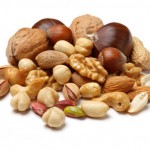 Eating nuts can lower cardiovascular disease risk. Nuts contain healthy fats that are associated with favorable blood lipid profiles. In this meta-analyis, researchers looked at 61 studies that examined the effect of tree nuts on blood lipids (tree nuts include walnuts, pistachios, macadamia nuts, pecans, cashews, almonds, hazelnuts, and Brazil nuts). They found that tree nut consumption was linked to blood markers associated with lower heart disease risk (lower total cholesterol, triglycerides, LDL cholesterol, and ApoB). The greatest effect was linked with consuming 60 grams of nuts or more daily (60 g nuts is equivalent to about 15 walnut halves). (American Journal of Clinical Nutrition).
Eating nuts can lower cardiovascular disease risk. Nuts contain healthy fats that are associated with favorable blood lipid profiles. In this meta-analyis, researchers looked at 61 studies that examined the effect of tree nuts on blood lipids (tree nuts include walnuts, pistachios, macadamia nuts, pecans, cashews, almonds, hazelnuts, and Brazil nuts). They found that tree nut consumption was linked to blood markers associated with lower heart disease risk (lower total cholesterol, triglycerides, LDL cholesterol, and ApoB). The greatest effect was linked with consuming 60 grams of nuts or more daily (60 g nuts is equivalent to about 15 walnut halves). (American Journal of Clinical Nutrition).
Cheerios Protein Healthwashing. Research shows that many people could benefit from eating more protein in the morning. Cheerios has a new cereal – Cheerios Protein – but don’t be fooled, since it is not a healthy breakfast option. It might be considered a dessert, as it has 17 times more sugar than regular Cheerios. And although it advertises that it contains 11 grams of protein, 4 of those grams come from the milk. (Center for Science in the Public Interest).
Why foods that make you fart can be a good thing. New research into the gut microbiome (the bacteria in your intestine) suggests that producing gas means that your body is hosting beneficial bacteria. Resistant starch appears to be a beneficial food component that offers cancer and disease protection. Beans and legumes are one of the best sources of resistant starch.
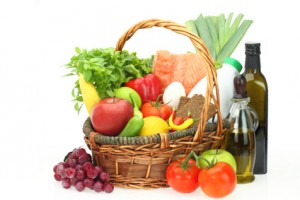 Mediterranean diet, olive oil & breast cancer risk. Another study adds to the growing evidence that eating a Mediterranean-style diet helps prevent disease. In this study (Predimed), women eating a Mediterranean diet reduced post-menopausal breast cancer risk by 51% compared to women in a control group. Karen Collins of the American Institute for Cancer research takes an in-depth look at this study, explaining how research typically characterizes Mediterranean-style diets by the amount of vegetables, fruits, legumes, nuts, whole grains, with olive oil as the primary source of added fat, and limited red meats or processed meats. The Predimed study found that olive oil consumption offered additional protection against cancer. Collins suggests that it’s possible that studies linking greater olive oil consumption with lower cancer risk may be “because olive oil use tends to go hand in hand with an overall healthy pattern that involves eating more vegetables and other healthful plant foods” and stressed that it’s important that increased olive oil consumption doesn’t increase overall calories, as being overweight is an established risk factor for breast cancer. (Karen Collins, reporting on JAMA Internal Medicine, Nov 2015.)
Mediterranean diet, olive oil & breast cancer risk. Another study adds to the growing evidence that eating a Mediterranean-style diet helps prevent disease. In this study (Predimed), women eating a Mediterranean diet reduced post-menopausal breast cancer risk by 51% compared to women in a control group. Karen Collins of the American Institute for Cancer research takes an in-depth look at this study, explaining how research typically characterizes Mediterranean-style diets by the amount of vegetables, fruits, legumes, nuts, whole grains, with olive oil as the primary source of added fat, and limited red meats or processed meats. The Predimed study found that olive oil consumption offered additional protection against cancer. Collins suggests that it’s possible that studies linking greater olive oil consumption with lower cancer risk may be “because olive oil use tends to go hand in hand with an overall healthy pattern that involves eating more vegetables and other healthful plant foods” and stressed that it’s important that increased olive oil consumption doesn’t increase overall calories, as being overweight is an established risk factor for breast cancer. (Karen Collins, reporting on JAMA Internal Medicine, Nov 2015.)
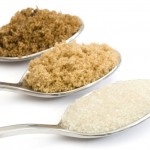 A day’s worth of sugar in a single good. The current recommended sugar intake for average individuals is about 12.5 teaspoons of sugar daily (average individuals are unfortunately sedentary, which exacerbates the effects of sugar; if you’re active you can get away with eating more sugar). For an overall healthy diet, it’s a good idea to reduce sugar intake, especially when you’re not moving your muscles. This article shows surprising foods that have over 12 teaspoons of sugar . . . and most of them aren’t even desserts! (The Atlantic).
A day’s worth of sugar in a single good. The current recommended sugar intake for average individuals is about 12.5 teaspoons of sugar daily (average individuals are unfortunately sedentary, which exacerbates the effects of sugar; if you’re active you can get away with eating more sugar). For an overall healthy diet, it’s a good idea to reduce sugar intake, especially when you’re not moving your muscles. This article shows surprising foods that have over 12 teaspoons of sugar . . . and most of them aren’t even desserts! (The Atlantic).
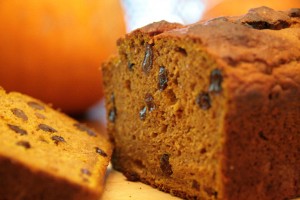
Healthful holiday baking. I do believe it is possible to produce great-tasting baked goods that are healthier than the typical holiday fare. Some smart ingredient substitutions can reduce the sugar, fat, and calories and add a bit of nutrition to traditionally empty calories. Leslie Beck offers some clever substitutions in Globe and Mail column (a year old, but still relevant!). Also check out the baked goods in my recipe section.
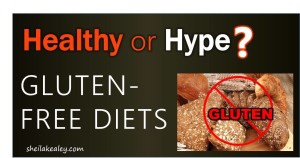 New in my Healthy or Hype Series: Gluten-Free Diets. There is certainly a lot of hype about gluten-free diets. In terms of diet trends assessed by Google, “gluten-free diet” searches have risen dramatically over the last 10 years. Gluten-free/grain-free diet books remain bestsellers. And along with the interest is a multi-million dollar industry catering to the growing demand for gluten-free products. But will going gluten-free benefit your health?
New in my Healthy or Hype Series: Gluten-Free Diets. There is certainly a lot of hype about gluten-free diets. In terms of diet trends assessed by Google, “gluten-free diet” searches have risen dramatically over the last 10 years. Gluten-free/grain-free diet books remain bestsellers. And along with the interest is a multi-million dollar industry catering to the growing demand for gluten-free products. But will going gluten-free benefit your health?
Canadian filmmakers feast for 6 months on discarded food. Did you know we are throwing out about 50% of food produced? Jen Rustemeyer and Grant Baldwin stopped grocery shopping and set a rule that they would only consume food in the trash (or destined to be thrown out). They document their experiment of eating discarded food in their documentary Just Eat It: A Food Waste Story. (NPR).
Be sure to check out their website, which has educational materials and more. Here is the movie trailer:
Just Eat It – A food waste story (Official Trailer) from Grant Baldwin on Vimeo.
Share This: